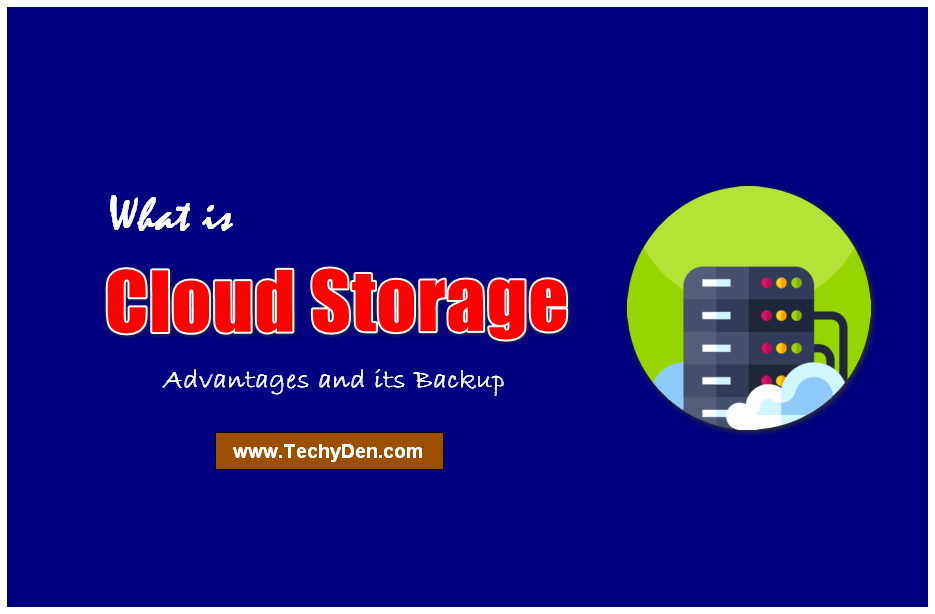In the digital age, businesses and individuals rely heavily on data. With the explosion of digital data, the need for storing, managing and accessing this data has become more important than ever.
Cloud storage has emerged as a popular solution to meet these needs. This article will explore everything you need to know about cloud storage, including its definition, types, benefits, and concerns.
What is Cloud Storage?
Cloud storage refers to a remote solution allowing individuals and organizations to store, manage, and access their data over the Internet.
It is a part of cloud computing that offers various computing services, including storage, processing, and software services over the Internet.
In cloud storage, data is stored on remote servers that can be accessed by authorized users from anywhere with an internet connection.
History of Cloud Storage
Cloud storage has been around since the early 2000s, but it gained popularity in 2006 with the launch of Amazon Web Services (AWS).
Since then, many companies, including Google, Microsoft, and Dropbox, have jumped on the bandwagon, offering a wide range of Cloud hosting storage services and solutions.
A Brief History of Cloud storage
- The history of cloud storage as far back as the 1950s. At the time, a computer was so great that it needed a whole room to contain it. Because mainframes (computers) were so expensive, organizations could not afford to buy a new one for each user.
- So they developed methods of “time-sharing”, which allow multiple users to share access to data and CPU. Today, this idea of “timeshare” is the premise of cloud computing.
- The next major event in the history of cloud computing took place in 1969 when JCR Licklider developed ARPANET (Advanced Research Projects Agency Network) in the hope that one day everyone would be able to access data and programs anywhere.
- Despite these early advances, the Internet does not have enough bandwidth to make the cloud accessible to everyone and those to the 90s.
- Professor Ramnath Chellappa was the first to use the term “Cloud Computing” in 1997 and 1999 Salesforce became the first site to offer applications and software on the Internet.
- Amazon officially launched in 2006 its own platform called Cloud Computing Amazon Web Services (AWS). AWS provides Online Cloud Storage for web sites or client-side applications. Amazon is very good on Cloud Storage Providers for Business.
- There are likely using AWS daily. Social media sites like Instagram and Pinterest are using AWS to accommodate traffic and data. In fact, AWS propels hundreds of thousands of sites and large organizations in more than 190 countries worldwide.
What is the Magnitude of the Cloud?
Nobody knows exactly how much space can be provided by cloud-based services like Google, Amazon or Facebook, but it is estimated that the cloud can store about 1 Exabyte (one billion gigabytes).
But what is the size of an Exabyte? Exabyte memory can contain the same amount of data that 4.2 million hard drives MacBook Pro. This is super mega storage space.
Types of Cloud Storage
There are three main types of cloud storage:
Public Cloud Storage
Public cloud storage is a cloud storage service offered by a third-party provider, and it is available to the public over the Internet. Public cloud storage is usually offered as a pay-per-use service, and users can access their data from anywhere with an internet connection.
Public cloud storage is a type of cloud storage that is open to the public and maintained by a third-party provider. Examples include Google Drive, Dropbox, and Amazon S3.
Private Cloud Storage
Private cloud storage is a cloud storage service dedicated to a single organization. Personal cloud storage can be hosted on a third-party provider’s infrastructure. Private cloud storage provides more security and control over data than public cloud storage.
Hybrid Cloud Storage
Hybrid cloud storage is a combination of public and private cloud storage. In hybrid cloud storage, organizations can store their sensitive data on personal cloud storage and use public cloud storage for less sensitive data. Hybrid cloud storage provides a cost-effective solution for organizations that need to store large amounts of data.
Benefits of Cloud Storage
The Cloud file storage offers several benefits over traditional storage solutions, including:
Cost-Effective
Cloud storage is a cost-effective solution compared to traditional storage solutions. Organizations can invest in inexpensive hardware, maintenance, and personnel to manage data storage.
Accessibility
It allows users to access their data anywhere with an internet connection. Users can access their data using any device, including smartphones, tablets, and laptops.
Scalability
It allows organizations to scale their needs up or down based on their business requirements. Organizations can add or remove storage capacity as their data storage needs change.
Security
It providers use advanced security measures to protect their users’ data from unauthorized access, theft, and loss. Most cloud storage providers offer data encryption, multi-factor authentication, and disaster recovery solutions.
Disaster Recovery
Cloud storage providers offer disaster recovery solutions that allow organizations to recover their data in case of data loss due to natural disasters, hardware failure, or cyber-attacks.
Concerns with Cloud Storage
Although cloud storage offers several benefits, it also poses some concerns, including:
Security Risks
Cloud storage providers are responsible for securing their users’ data, but there is always a risk of data breaches, hacking, and other cyber attacks. Organizations need to protect their data by using strong passwords, multi-factor authentication, and encryption.
Downtime
Cloud storage providers may experience downtime for various reasons, including maintenance, system upgrades, and technical issues. Downtime can result in data loss, and organizations should have a backup plan to mitigate the impact of downtime.
Privacy
Cloud storage providers may have access to users’ data, and there is a risk of data being accessed by unauthorized personnel. Organizations should ensure that their data is stored on secure servers and control who can access their data.
How Cloud Storage Works
Cloud storage works by storing your data on a remote server accessible through an internet connection. Here are the two critical aspects of how cloud storage works:
Overview of Cloud Storage Architecture
Cloud storage architecture typically consists of multiple layers, including physical servers, Virtual storage servers, and data storage systems. Each layer is responsible for a specific function, such as data storage, backup, or security.
Cloud Storage Technologies and Protocols
Cloud storage uses various technologies and protocols, including HTTP, REST, and SOAP, to allow users to access their data through the Internet. Additionally, many Internet-based storage providers offer APIs enabling developers to integrate cloud storage into their applications.
Choosing the Right Cloud Storage Provider
Choosing the right cloud storage provider is essential for ensuring your data is secure, accessible, and cost-effective. Some factors to consider when selecting a Internet-based storage provider include:
- Security measures
- Service uptime and reliability
- Pricing and storage options
- Integration with other services
- Customer support and service
There are various factors to consider when selecting a cloud storage provider, such as storage capacity, pricing, security features, and ease of use.
Factors to Consider when Choosing a Cloud Storage Provider
Storage capacity is essential, especially for businesses and individuals with large amounts of data. Pricing is also critical as it determines the cost-effectiveness of the service. Security features such as encryption, two-factor authentication, and data backup are essential to protect user data. Ease of use is another crucial factor as it determines the user experience and accessibility of data.
Popular Cloud Storage Providers and Their Features
Various cloud storage providers are available in the market, each with unique features and pricing. Some popular Internet-based storage providers include Google Drive, Dropbox, OneDrive, and iCloud.
- Google Drive offers 15GB of free storage, while Dropbox offers 2 GB.
- OneDrive comes with a subscription to Microsoft Office and offers 5GB of free storage.
- iCloud provides 5GB of free storage and is suitable for Apple users.
Future of Cloud Storage
Cloud storage has significantly impacted how individuals and businesses store and access data. As technology advances, new trends are emerging in cloud storage, such as edge computing, multi-cloud storage, and hybrid cloud storage.
New and Emerging Trends in Cloud Storage
Edge computing allows for faster processing of data by processing data closer to the source, reducing latency and enhancing Cloud data storage performance. Multi-cloud storage involves using multiple cloud storage providers, enabling users to take advantage of various features provided by different providers.
Hybrid cloud storage combines private and public cloud storage, allowing businesses to keep sensitive data on private servers and non-sensitive data on public servers.
Impact of Cloud Storage on Businesses and Individuals
Cloud storage has changed how businesses store and access data, leading to more efficient and cost-effective operations. It has also allowed for remote work, enabling employees to access data from any location.
Cloud data storage has also impacted individuals, providing a convenient way to store and share data such as photos, videos, and documents.
Frequently Asked Questions
What is cloud storage?
Cloud storage refers to a remote solution allowing individuals and organizations to store, manage, and access their data over the Internet.
What are the types of cloud storage?
There are three main types of cloud storage: public cloud storage, private cloud storage, and hybrid cloud storage.
What are the benefits of cloud storage?
Cloud file storage offers several benefits, including cost-effectiveness, accessibility, scalability, security, and disaster recovery.
Is Cloud Storage safe and secure?
While cloud storage is generally safe and secure, there are always risks when storing data online. Cloud backup storage providers use encryption and other security measures to protect user data, but following best practices such as using strong passwords and enabling two-factor authentication is essential. It’s also important to research the security practices of a cloud storage provider before choosing to use their services.
What are the concerns with cloud storage?
Concerns with Cloud backup storage include security risks, downtime, and privacy.
How do I choose the right cloud storage provider?
When choosing a cloud storage provider, factors include security measures, service uptime and reliability, pricing and storage options, integration with other services, and customer support and service.
Summary of Key Points
- Cloud storage provides a convenient way to store and access data from any location.
- Security and privacy concerns associated with Online storage include data breaches, data loss, and unauthorized access to data.
- Best practices for cloud storage include using strong and unique passwords, enabling two-factor authentication, and limiting access privileges to essential users.
- When choosing a Web-based storage provider, factors include storage capacity, pricing, security features, and ease of use.
- Popular cloud storage providers include Google Drive, Dropbox, OneDrive, and iCloud.
- Emerging trends in cloud storage include edge computing, multi-cloud storage, and hybrid cloud storage.
- Online storage has impacted businesses and individuals by providing a more efficient and cost-effective way of storing and accessing data.
Final Recommendations for Cloud Storage Users
To ensure data security and privacy, users should regularly monitor their accounts for suspicious activity, set up alerts, and keep their cloud storage clients and applications up-to-date.
Users should also use strong and unique passwords, enable two-factor authentication, and limit access privileges to essential users. Following these best practices allows users to safely and effectively use cloud storage.
In conclusion, cloud storage has proven to be a game-changer in data storage and management. Its benefits and convenience have made it an essential tool for many individuals and businesses.
While security and privacy concerns exist, proper precautions and best practices can help mitigate these risks. As technology continues to evolve, the future of cloud storage looks bright, offering even more advanced features and capabilities.
With this article, we hope to have provided you with a deeper understanding of cloud storage and have guided you in choosing the right provider for your needs.
Cloud storage has become essential for businesses and individuals to store, manage, and access their data. It offers several benefits, including cost-effectiveness, accessibility, scalability, security, and disaster recovery.
However, there are also concerns with cloud storage, including security risks, downtime, and privacy. Choosing the right cloud storage provider is critical to ensuring your data is secure and accessible.







